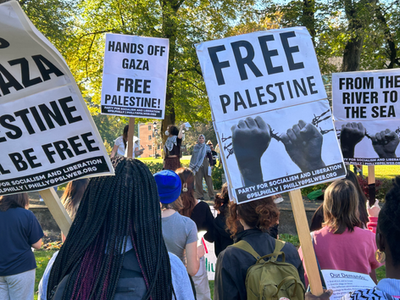By Bina Kelman-Morris
The ongoing blockade in Gaza has affected all aspects of Palestinian life, with the healthcare system, in particular, being devastated. To give context, it is necessary to go back to 2005, when the Israeli Defense Forces (IDF) withdrew from the Gaza Strip in 2005. During this time, Dov Weisglass, senior advisor to the Israeli Prime Minister, said, “The significance of the disengagement plan is the freezing of the peace process. And when you freeze that process, you prevent the establishment of a Palestinian state, and you prevent discussion on the refugees, the borders, and Jerusalem.”
This statement from a senior Israeli official serves as a striking contradiction to more recent Israeli narratives that position their withdrawal from Gaza as a “failed” attempt to bestow autonomy and self-governance upon the Palestinians, only for their benevolence and good will to be squandered by the election of HAMAS (Harakat al-Muqawama al-Islamiya, or Islamic Resistance Movement) whose unwillingness to cooperate “forced” Israel to initiate a total land, air, and sea blockade of Gaza. Weisglass’ statement suggests that the military strategy behind Israel’s withdrawal was never about peace but instead was a calculated attempt at escalating its war of attrition and collective punishment against the Palestinian people. Israel’s ongoing assault is specifically affecting healthcare, but this does not represent a departure from its previous practices: Israel has been denying the entry of life-saving medical equipment into the Gaza Strip while simultaneously refusing Palestinians the freedom to travel outside in search of medical treatment for years.
In 2022 alone, three Palestinian children in Gaza died while waiting for travel permits to seek life-saving medical care outside of Gaza, while an average of two children every day were denied travel permits for medicinal care. Beginning in 2018, when Gazans launched weekly non-violent demonstrations known as The Great March of Return, Israeli snipers began a practice known as “knee-capping,” where they would intentionally aim to maim Palestinian protestors by shooting them in the knees, knowing that Gaza’s besieged health infrastructure did not have the aseptic or surgical capacity to safely care for these wounds. According to Haaretz, one Israeli sniper bragged about shooting “42 knees in one day.” Between 2018 and 2020, UNICEF reported that over 7,000 Palestinians were shot in the limbs with so-called “non-lethal ammunition” by Israeli soldiers, resulting in 156 amputations. 94 of these cases would require secondary amputations due to bone infections.
Sources by Jaleel Laraki
Jefferson students walked out of class in support of Palestine in October 2023.
All of this was before October 7, 2023. Israel’s latest genocidal assault on the besieged Gaza Strip should not be thought of as an exception to the violence of 75 years of occupation, but rather as a logical extension of it. Since October 7, the IDF has declared war on the very possibility of life itself in Gaza. Israel’s unceasing aerial bombardment continues to target residential buildings, hospitals, ambulances, refugee camps, shelters, clinics, schools, bakeries, aid trucks, mosques, churches, and more. According to the Euro-Med Human Rights Monitor, as of February 13, at least 317 healthcare workers have been killed by Israel, with more than 415 additional injured in this time frame. These numbers are unprecedented in recent conflicts across the globe. Without electricity or access to medicine, including anesthesia for amputations and insulin for diabetic patients, Palestinian healthcare workers have been wholly deprived of the resources necessary to fulfill their oaths and duties as caregivers and healers. The healthcare situation in Palestine right now is nothing short of a living nightmare, with Palestinian healthcare workers as well as international humanitarian organizations describing a total collapse of health infrastructure.
"The healthcare situation in Palestine right now is nothing short of a living nightmare..."
Israel’s attempt to ethnically cleanse the Gaza Strip has necessitated the systematic targeting of Palestinian health care workers. This includes the tactic of “terror-tagging” individual doctors as well as entire healthcare facilities, such as the unfounded accusations leveled by the IDF that Al-Shifa hospital was being used as a base of operations by the armed wing of HAMAS, the Al-Qassam Brigades. These accusations have been utilized as justification for Israeli military operations targeting hospital staff and patients, which constitute war crimes. One doctor stationed at Al-Ahli Hospital, Dr. Said Abdulrahman Maarouf, describes being detained for 45 days and enduring brutal torture at the hands of Israeli soldiers who accused him of being a member of the Palestinian resistance.
Additionally, Israel’s war on Palestinian health infrastructure extends beyond the direct targeting of hospitals, healthcare workers, and ambulances. The Israeli army has forcibly supplanted millions of Palestinians in Gaza to the southern border city of Rafah. Displaced Palestinians are living in tents that have come under intense Israeli bombing. The tent cities have become the centers of infectious disease outbreaks, such as respiratory infections and diarrhea, which have soared to hundreds of thousands of cases due to unsanitary conditions. Palestinians in Gaza lack access to clean water, hygiene and menstrual products, food, proper sewage and waste management, and more. As these horrors continue to unfold, Palestinians and their allies have been demanding world leaders pressure the Israeli government to halt its genocidal assault and allow for desperately needed aid to be allowed to enter into Gaza. Their shouts have been met with a truly jarring campaign of dehumanization from Zionist and Western media outlets who continue to portray Palestinians as an “entire nation” of “legitimate targets” who are at fault for their own slaughter.

Source by Jaleel Laraki
Students gather to listen to personal stories at the walkout in October 2023.
Social media has offered the world a window into the daily horrors experienced by Palestinians, and has become an important tool in the fight against the dehumanization of Palestinians, especially thanks to the brave work of journalists such as Bisan Owda, Hind Khoudary, Waed el-Dahdouh, Plestia Alaqad, Motaz Azazia, and many more who have risked their lives to document Israeli war crimes. As of February 16, 2024, 130 Palestinian journalists have been killed in Gaza since October 7. Through these filmmakers and journalists, the world has also witnessed firsthand the breathtaking humanity of the Palestinian people and their capacity to care for and love each other amid unimaginable suffering. This intimate access to the perspectives of victims of an unfolding genocide has shocked the collective conscience of the world and many healthcare workers.
Here at Jefferson East Falls, many students, including hundreds who are aspiring future healthcare workers, have expressed their solidarity with Palestine through social media engagement, wearing keffiyehs around campus every week, attending teach-ins on the history of Palestine, and joining demonstrations calling for national divestment from Israel.
Naheda Dahleh, a sophomore in Law & Society and Palestinian student, called students' attention to Jefferson’s collaboration with Israeli biotech companies as well as the 15% tuition discount that employees of the Raytheon weapons manufacturing company may receive at the university. Dahleh shared, “Jefferson has direct stakes in the occupation through partnerships with companies directly supporting the genocide [of Palestinians].”
Annabelle Kim, a PA student in their professional track period at Jefferson, noted that for many, “...the genocide seems so far away from our borders… and we act as though it does not matter. However, as healthcare providers, we must stand with those whose literal lives are being taken away. People in healthcare want to help people!”
“...the genocide seems so far away from our borders… and we act as though it does not matter. However, as healthcare providers, we must stand with those whose literal lives are being taken away."
For many students who came to this college with dreams of becoming healthcare professionals and caregivers, it has been impossible to look away as tens of thousands are disabled and slaughtered with bombs paid for by their very own tax money. The bravery and steadfastness of Palestinian healthcare providers has also captured the hearts and minds of millions of people and inspired them to call for an end to the occupation and freedom for the Palestinian people.
In a widely circulated video posted to social media in mid-October, Palestinian doctors inside Al-Awdah Hospital can be seen standing proudly upright, singing to their patients with smiles on their faces. “We will stay here until the pain is over, we will live here, and we will keep singing.”
Their words were a defiant refusal of the IDF’s demand that they leave patients behind, including individuals who were critically wounded, elderly, babies, and pregnant, and evacuate immediately or be bombed. This sentiment of resistance and profound interdependence was then echoed again by Dr. Hammam Alloh, a nephrologist at Al-Shifa Hospital who, after being warned by the Israeli military to evacuate, responded in an interview on Democracy Now by asking simply, “You think I went to medical school and for my postgraduate degrees for a total of 14 years so I think only about my life… if I go, who treats my patients? We are not animals. We have the right to receive proper health care.”
"...if I go, who treats my patients? We are not animals."
In a moment of unimaginable carnage and slaughter, healthcare workers like Dr. Alloh and the doctors at Al-Awdah refused to leave the most vulnerable members of their community behind. Facing certain death, Palestinian healthcare workers continue to reaffirm their commitment to life. Since the video of the doctors singing to their patients first made rounds on social media and Dr. Alloh’s interview was first aired, the IDF has repeatedly bombed Al-Awdah Hospital. Numerous healthcare workers were killed including two doctors who worked for Medicin Sans Frontiere (MSF, or Doctors Without Borders), as well as countless displaced and injured Palestinians who have had no choice but to shelter in the courtyards of hospitals as rooms and hallways overflowed with the dead and dying. They have also bombed displaced Palestinians sheltering in the courtyard of Al-Shifa hospital, stormed the compound with tanks declaring “victory” over the hospital staff and refugees, and murdered Dr. Alloh along with multiple members of his family in targeted airstrikes. Al-Shifa and Al-Awda are just two of the 25 hospitals in Gaza that have been forced to partially or completely cease operations due to Israel’s relentless bombardment.
It is stories like these that have galvanized millions of people around the world into action and continue to inspire healthcare workers and future healthcare workers to stand in solidarity with Palestinians in their demand for a permanent ceasefire, an end to the blockade on Gaza, freedom for all Palestinian prisoners, an end to the occupation of all of Palestine by the Zionist entity of Israel, and a unified, liberated Palestine from the river to the sea.




Comments